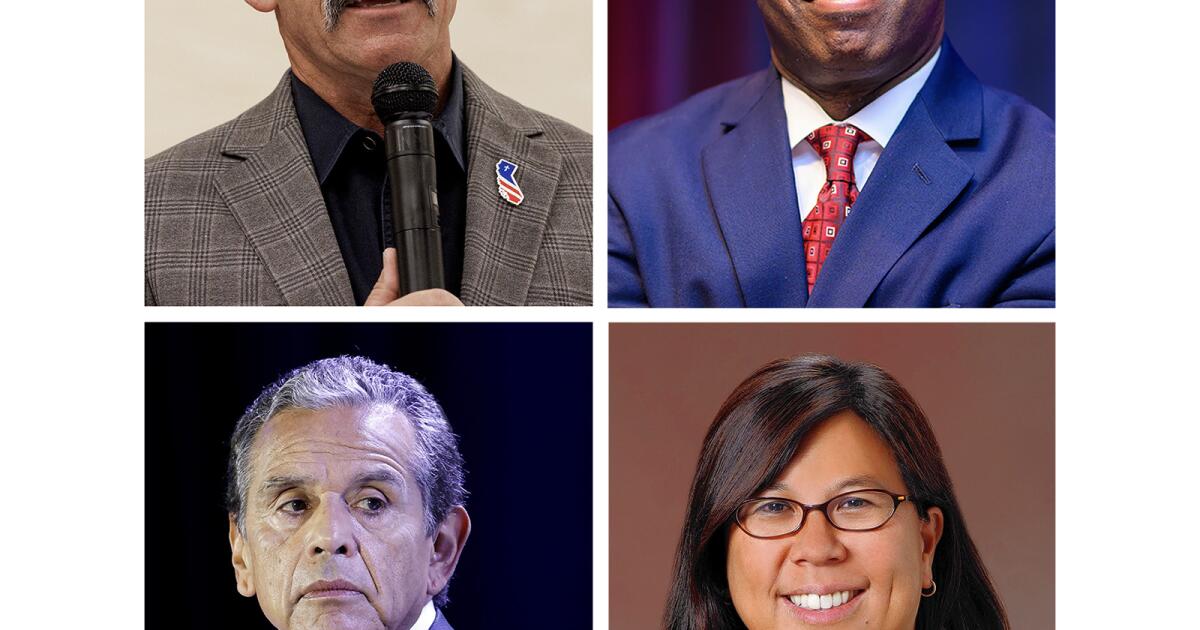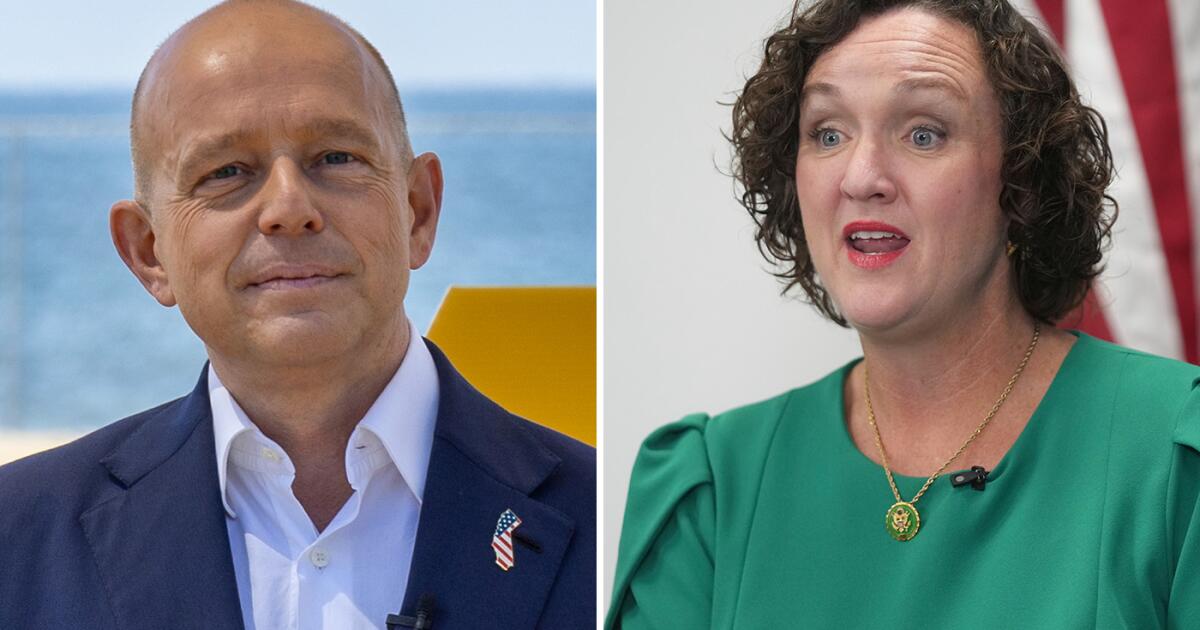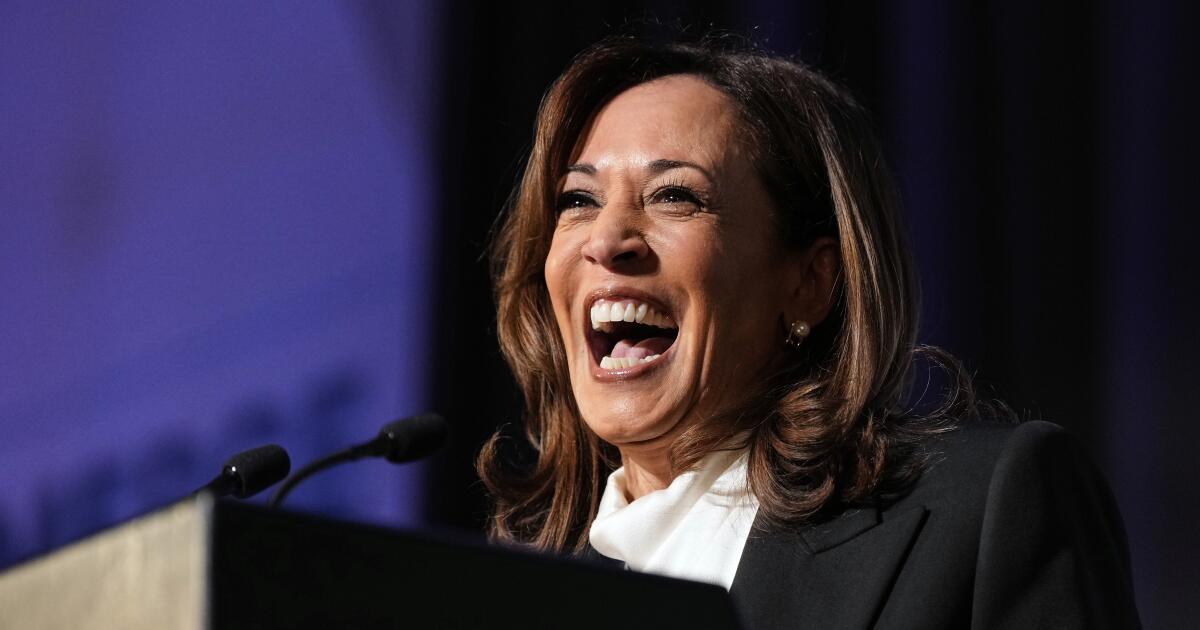Jobs and economic struggles of Californians light up central to clash between candidates for governor
STOCKTON — Four of California’s gubernatorial candidates tangled over climate change and wildfire preparedness at an economic forum Thursday in Stockton, though they all acknowledged the stark problems facing the state.
Riverside County Sheriff Chad Bianco, a Republican, stood apart from the three other candidates — all Democrats — at the California Economic Summit by challenging whether the spate of devastating wildfires in California is linked to climate change, and labeling some environmental activists “terrorists.”
After a few audience members shouted at Bianco over his “terrorists” comment, the Democratic candidates seized on the moment to reaffirm their own beliefs about the warming planet.
“The impacts of climate change are proven and undeniable,” said Tony Thurmond, a Democrat and California superintendent of public instruction. “You can call them what you want. That’s our new normal.”
The fires “do have a relationship with climate change,” said former Los Angeles Mayor Antonio Villaraigosa.
Besides environmental issues, the hour-and-a-half forum at the business-centric California Forward’s Economic Summit focused primarily on “checkbook” topics as the candidates, which also included former state Controller Betty Yee, offered gloomy statistics about poverty and homelessness in California.
Given the forum’s location in the Central Valley, the agricultural industry and rural issues were front and center.
Bianco harped on the state and the Democratic leaders for California’s handling of water management and gasoline prices. At one point, he told the audience that he felt like he was in the “Twilight Zone” after the Democrats on stage pitched ways to raise revenue.
Other candidates in California‘s 2026 governor’s race, including former Secretary of Health and Human Services Xavier Becerra and former Rep. Katie Porter, were not present at Thursday’s debate. Former Assembly Majority Leader Ian Calderon planned to come, but his flight from Los Angeles was delayed, audience members were told.
All are vying to lead a state facing ongoing budget deficits caused by overspending. A state Legislative Analyst’s Office report released this month cited projected annual operating deficits ranging from roughly $15 billion to $25 billion through 2029. At the same time, federal cutbacks by the Trump administration to programs for needy Californians, including the state’s Medi-Cal healthcare program, will put more pressure on the state’s resources.
All of the candidates had different pitches during the afternoon event. Asked by moderator Jeanne Kuang, a CalMatters reporter, about ways to help rural communities, Thurmond cited his plan to build housing on surplus property owned by the state. He also repeatedly talked about extending tax credits or other subsidies to groups, including day-care providers.
Yee, discussing the wildfires, spoke on hardening homes and creating an industry around fire-proofing the state. Yee received applause when she questioned why there wasn’t more discussion about education in the governor’s race.
Villaraigosa cited his work finding federal funds to build rail and subway lines across Los Angeles and suggested that he would focus on growing the state’s power grid and transportation infrastructure.
Both the former mayor and Yee at points sided with Bianco when they complained about the “over-regulation” by the state, including restrictions on developers, builders and small businesses.
Few voters are probably paying much attention to the contest, with the battle over Proposition 50 dominating headlines and campaign spending.
Voters on Nov. 4 will decide whether to support the proposition, which is a Democratic-led effort to gerrymander California’s congressional districts to try and blunt President Trump’s attempt to rig districts in GOP-led states to retain control of the House of Representatives.
“Frankly, nobody’s focused on the governor’s race right now,” Yee said at an event last week.


